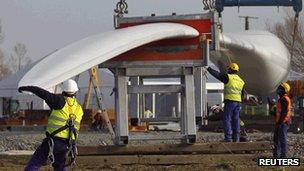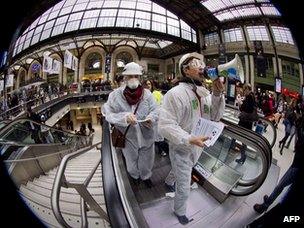Has the 'greenest government ever' gassed itself?
- Published

Chancellor George Osborne is accused by greens of casting a long shadow over climate policy
A few weeks ago, I was chatting to a group of people from environmentally-minded UK think-tanks when the issue of the "greenest government ever" came up.
In case you've forgotten, David Cameronpledged, externalto lead such a government on becoming Prime Minister in 2010.
Eighteen months on, and one of my companions put it this way: "They've already lost it on everything but climate change, and they're just about clinging onto that".
The question being asked in similar circles now is whetherSaturday's announcement, externalon gas-fired power stations means that climate policy has effectively "gone" as well.
New electricity generation of some kind is needed, as several ageing coal and nuclear stations will close over the next few years.
What the Treasury and the Department for Energy and Climate Change (Decc) announced was that gas-fired power stations can continue operating with carbon dioxide emissions at around current levels until 2045.
Chancellor George Osborne said the move would provide certainty to businesses considering whether to invest in gas generation.
"Gas is a reliable, affordable source of energy," he said.
"We need to recognise that gas will be a vital part of the mix in delivering affordable and secure low-carbon energy."
Off the pathway

Though wind ambitions remain, it is not certain that turbines can be built quickly enough
However, there is a marked mismatch between what the government and its statutory advisers on what constitutes "low-carbon energy".
The Committee on Climate Change (CCC) produces "carbon budgets", setting out what the government should aim to achieve at various stages en route to the eventual aim, enshrined in legislation, of cutting emissions by 80% from 1990 levels by 2050.
One of the committee'scentral recommendations, externalis that the electricity sector should aim to "virtually decarbonise" by 2030 - the reason being that decarbonisation is easier to do here than in other parts of the economy such as transport or agriculture, so this is the pathway that is easiest and cheapest.
It's a goal that the prime minister said last year he "basically endorsed",telling MPs: "If we don't decarbonise electricity we've got no hope of meeting all the targets that we are all committed to."
Taking Mr Cameron's words at face value, then, perhaps the Decc/Treasury announcement should be sub-titled "Abandon Hope".
These are the relevant numbers.
The government set the ceiling for emissions from gas-fired power stations until 2045 at 450 grams of carbon dioxide per kilowatt hour (450gCO2/kWh).
The CCC forecasts UK electricity consumption rising to 450 terawatt hours (450 thousand million kilowatt hours) per year by 2030.
If all the UK's electricity were to come from gas at 450gCO2/kWh, that would produce 202 million tonnes (202Mt) of CO2.
But the CCC's suggested ceiling for the entire electricity sector is just 20Mt.
So to stay within budget, only 10% of UK electricity can come from gas, or the pathway leading through "virtually decarbonised" electricity by 2030 has to be abandoned.
Watering down
In fact, ministers have already been talking the target down.
At the European Council meeting 10 days ago that discussed possible changes to EU climate targets, the UK presented a paper saying that the optimum pathway involved electricity decarbonisation "in the 2030s" - effectively, a delay of up to a decade from the committee's recommended "by 2030".
In tandem, some analysts have been talking of gas providing about 50% of UK electricity by 2030.
The Committee on Climate Change's prescription for 2030 was basically about 40% renewables and 40% nuclear, with the remainder consisting of gas-fired plants - some with carbon capture and storage (CCS) - and other tidbits.

A number of factors, including the Fukushima disaster, may restrain nuclear new build
A number of emerging factors make the nuclear figure unlikely, while rising prices for offshore wind turbine installation mean the likelihood of achieving 40% there is certainly not advancing.
Coal without CCS has basically been banned because of its high emissions; so 50% for gas has its logic.
The problem is, it busts climate targets.
"There are growing pressures to create a UK energy system very heavily dominated by gas," Michael Grubb, chair of energy and environment policy at Cambridge University, told BBC News.
"There's a risk that the government is trying to give the gas industry assurances that could be misleading because they are not compatible with all we know about climate change."
The electricity sector could still achieve virtual decarbonisation by 2030 through equipping gas or indeed coal power stations with CCS.
But that technology doesn't yet exist on a commercial scale. Even if it did, it would certainly add cost to gas plants' operations, and so would only be implemented only through a government requirement or through a financial incentive.
Neither of those exists either. If the government had followed the CCC's advice and set ceilings for gas-fired power stations that tapered down over the years to 50gCO2/KWh, the picture would be different.
According to the committee's work, the UK could still potentially reach its long term 80% emission reduction target by cutting faster in other sectors; but it would be more expensive, even it it's technically feasible.
Costly path?
The government sees greater reliance on gas as providing energy security and economical energy. But environment groups disagree, pointing out that most of the recent rise in energy bills stems from more expensive gas - even without the fact that oil and gas prices can vary wildly.
"A new dash for gas will leave UK citizens at the mercy of rising and volatile fossil fuel prices," said Keith Allott of WWF.
"It's staggering that the Treasury is bending over backwards to support a fuel that is to blame for 80% of the recent hike in energy bills."
Recent research, externalhas also cast doubt on the widespread belief that if coal-fired plants close and are replaced by gas, the climate wins.
Gas produces roughly half as much carbon dioxide as coal when burned. However, coal-burning also emits tiny dust particles, aerosols, which have a cooling effect.
Taking this into account, and the short-term nature of aerosols versus the long lifetime of CO2, US researchers showed that a global switch from coal to gas would indeed restrain temperature rise - but not until after 2050.
And that is if none of the gas leaks from pipelines - which it does.
Natural gas - methane - is itself a potent greenhouse gas; and with a likely leakage rate taken into account, the US research team showed, it would take more than 100 years for a coal-to-gas switch to curb the rate of global warming.
So gas for coal is not, at present, a low-carbon energy strategy.
The government says it is committed to its "greenest ever" ambition, citing tree-planting, water quality improvements, the Green Investment Bank and annual carbon budgets among its achievements.
Critics point to badger culling, the abortive attempt to sell off English forests, urban air pollution and watering down of planning regulations as proof it's a mirage; and now, to a "low carbon energy policy" that may turn out to be no such thing.
The government's gas proposals aren't yet enshrined in legislation, though it wants them to become so during the course of this parliament.
So it is possible for them to be amended.
However, there is an argument for marking your diary entry for 17 March 2012 - not yet in ink, but certainly in pencil - as the day the "greenest government ever" label finally fell off in a blast of natural gas.
Follow Richardon Twitter, external
- Published19 March 2012
- Published16 March 2012
- Published15 December 2011
- Published14 October 2011
- Published11 October 2011